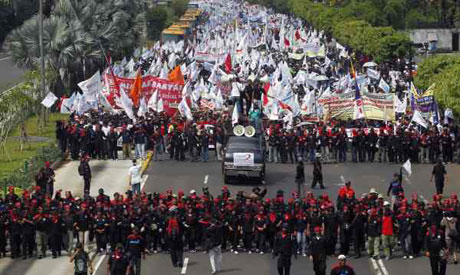
Indonesian labourers march to the presidential palace during a rally in Jakarta. More than 15,000 labourers stage rallies on Sunday in Jakarta and other big cities in Indonesia to mark May Day, calling on the government for improvements in employment policies, (Reuters).
Thousands of people took to the streets across Asia on Sunday, marking May Day from Indonesia to South Korea with demands for better rights and wages for workers facing soaring living costs.
Several thousand marched in Hong Kong in a noisy procession calling for stronger labour laws, even as the city best known as a glitzy financial hub introduced the first ever minimum wage for its legions of low-paid workers.
At least 4,000 people processed through the downtown area of the densely populated city, banging cymbals and drums in protest against fast-rising rents and food prices and shouting: "Put an end to worker exploitation!"
Some carried giant images of the tycoons who dominate the city's economy, with bloodstained vampire fangs drawn on.
Most workers in the southern Chinese territory are now entitled to at least HK $28 ($3.60) an hour. Unions hailed the measure as a step forward but said more is needed for the hundreds of thousands on low incomes.
"Workers should be able to share society's fruits of labour," said Stanley Ng, chairman of the Federation of Trade Unions.
In Seoul at least 50,000 workers gathered to chant slogans calling for higher pay and better job security and to slam the conservative administration, with thousands of police deployed to the largely peaceful demonstrations.
"Our livelihood has been ruined by anti-labour policies, rising unemployment and a widening wealth gap for the past three years under (President) Lee Myung-Bak," the Korean Federation of Trade Unions said in a statement.
Protesters criticised labour laws they said had made job cuts easier, with one -- his face painted with mock tears of blood -- holding a sign saying: "I knew it was coming."
In the much poorer Philippines, thousands of demonstrators in Manila and other major cities demanded improved wages and an end to the policy of sending workers overseas. Nine million Filipinos are estimated to work abroad.
"For the past several years, the government has always made a show of holding Labour Day job fairs. But why do many Filipinos still go overseas to look for greener pastures, even at their own risk?" said Vencer Crisostomo, chairman of the group Anakbayan.
"It's because these job fairs do not solve the problem of low wages in locally based jobs."
President Benigno Aquino in a Labour Day message rejected accusations he had failed on a campaign promise to raise living standards.
"Those who are telling you that lasting changes can be made overnight or in a month are only pulling your leg... What is clear is that we are headed to real, significant changes," he said.
Protesters in Indonesia called for better social security, turning out in their thousands -- with some 10,000 security personnel in attendance -- to shout slogans such as "the country is rich but the people are poor".
Demonstrators at the peaceful rally carried a coffin covered with a black cloth bearing the slogan "The death of justice" as they called for lifelong health insurance and a pension fund.
"There is no social justice for Indonesians without social security," said a statement from more than 60 labour unions.
In Taiwan, where presidential elections are due in January 2012, more than 3,000 blue-collar workers protested the island's widening wealth gap, with labour groups urging voters to express their discontent at the ballot box.
"Over the past three years ... the number of the poor has increased, while the rich have paid less tax," protest leader Wang Jung-chang told a rally in Taipei, calling the protest a "warning" to President Ma Ying-jeou.
The Asian Development Bank warned last week that tens of millions of Asians could be pushed into extreme poverty this year and the region's economic growth dented by skyrocketing global food and oil prices.
Domestic food inflation in developing Asian nations hit 10 percent at the start of this year, with double-digit rises in the price of wheat, corn, sugar, edible oils, dairy products and meat, the Manila-based institution said.
Short link: